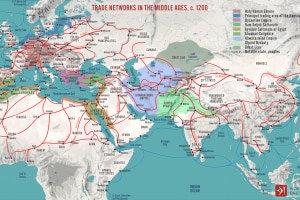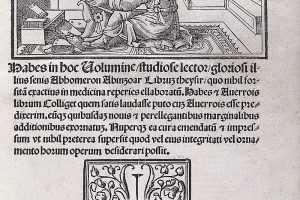Introduction
The Holy Founder of Islam(saw) placed great emphasis on learning. His specific instruction was to “seek knowledge from the cradle to the grave.”1
Acting upon this directive, the early Muslims embarked upon the pursuit of knowledge and learning, the blessings emanating from which were to inspire a great civilisation in which Muslims and non-Muslims alike lived creative and useful lives and which, by its achievements, enriched the whole world. Islam developed from among an unlettered people far removed from the crossroads of civilisation and human thought to become the standard-bearer of enlightenment in the then known world.
History bears witness that Islam, far more than Christendom, was the intermediate stage between the ancient East and the modern West. During the centuries that in European history are called medieval, the most advanced civilisation in the world was undoubtedly that of Islam. Under the blessed Khulafa-ar-Rashideen (Rightly guided successors), and again under the Persian and Turkish dynasties, the empire of Islam was the most powerful, most creative and most enlightened region in the world.
In that golden era of Islam, great libraries were built and universities were established. Great works of the Greeks, Indians, Persians and Egyptians and numerous religious texts were translated and preserved. Scholars from various religions and cultures were drawn to this enlightened empire while all the time Europe was in the midst of the ‘Dark Ages’.
This article provides a brief overview of the importance placed by Islam on seeking and acquiring knowledge and in particular the remarkable progress made by early Muslims in the field of Science.
Islam and Science
Progress comes in many forms. It is the desire to recognise and extract the genius from within us that necessitates the seizure of a problem and the application of a uniqueness of thought and approach; a focus on outcomes that discards prejudices and preconceptions, and challenges, with relish and gusto, accepted interpretations and common understandings. However, it is by partaking of Divine knowledge passed on to us by the Prophets of Allah that we can establish in practice what the poet Ezra Pound once said, “Genius…is the capacity to see ten things where the ordinary man sees one.”
Common amongst all geniuses is free thought. It is that free thinking; that search for knowledge and its intrinsic connection with Islam which this article seeks to address.
It is the quest for knowledge that opens the doors of progress; where Muslim minds seek not only to demonstrate their genius but to apply it to achieve progress in service to their Creator.
The natural intelligence that underlies genius is one of the most profound of human faculties and probably our most important. Deriving from the Arabic word “aql”, its Islamic significance stems from the essential obligation of every Muslim to see and understand truth. Some of those truths require thought; some are self-evident.

Take, for instance, the concept of Unity of Allah. Rooted in the pre-eminent and paramount undertaking that every Muslim makes, that there is none worthy of worship save Allah, our intellect induces a recognition of the Unity of Allah as the dominant force behind all things good. This universal truth, self-evident to every Muslim scientist, dispels the so-called contradiction between Islam and science.
Many thinkers would ask how the alleged dichotomy of science and religion could in any way be resolved, so let us deal with that.
Whereas the scientific society may suggest that, for instance, Fourier’s Law of Heat Conduction, or Bernoulli’s Law of Fluid Dynamics are human theories that determine the conduction of heat, or the pressure and flow-speed of liquid respectively, a Muslim scientist’s intellectual recognition of the existence of Allah, itself a self-evident truth, obviates this fallacy. A Muslim scientist is able to apply these scientific laws, whether they be Fourier’s Law, Bernoulli’s Law or indeed Newton’s Law of Motion, not as a determinant dreamed up by secular scientists, but rather the evidence that these laws represent some of the many wonderful manifestations of Allah’s Will.
And Allah has made such Will clear, rewarding man with scientific understanding in the Holy Qur’an itself.
The Holy Qur’an says:
And we made of water every living thing. Will they not then believe? (Ch.21:V.31)
The relationship between water and all living organisms is readily understood. Science has now determined beyond doubt that, in line with this Qur’anic declaration, living organisms indeed are largely constituted from water.
The Holy Qur’an also notes in the same verse:
Do not the disbelievers see that the heavens and the earth were a closed up mass then we opened them out? (Ch.21:V.31).

Science has now demonstrated that the universe was developed from an indistinct mass. We now know that the fundamental particles in the universe and those found in earthly matter are of identical constitution.
Whilst only few of the many examples of the Qur’an have been quoted, they are cogent and decisive. They demonstrate that Islam is entirely consistent with science because science, at its root, is in fact the study of Allah’s work.
Contribution of Muslim Scientists
For centuries Muslims pushed the outer limits of accepted thought, introducing the world to concepts that would underpin the development of science beyond boundaries thought humanly possible at the time.
Islam’s rapid spread during the time of the Holy Prophet(saw) and under the leadership of the Rightly-guided Khulafa precipitated what is commonly referred to as the Golden Age of Islam – a period which ushered in immense contributions to philosophy, science, engineering and governance.
An expansion of Muslim dominance spanning the Middle East, and stretching as far as Europe and North Africa brought the widespread implementation of modern science by some of the most outstanding scholars that the world has known.
The development of modern medicine, astronomy and mathematics, the refinement of algebra and trigonometry and the physical use of optics were legacies from an Islamic era. Muslim scientists brought both knowledge and application into inventions that remain central to modern life today. Everything from simple tools such as scissors to complex water-powered pumping machines and standardised weighing scales are all contributions from Muslim scientists.
Indeed their legacy lives on, not only in machines but words too. Many words today retain their Arabic origins: “algebra”, “algorithm”, “zenith”, “alchemy” to name but a few.
Yet the progression of science did not exist in isolation to the Divine Creator; in fact, it progressed because of it. We see this in the guidance Allah provided man in the Holy Qur’an.
Study of the Holy Qur’an
Indeed, the study of the Holy Qur’an is central to scientific research. The development of life, both in human and other forms, is specifically addressed by the Holy Qur’an. Revealing the possibility of more advanced creation with sensory perceptions beyond the five human senses that we currently know and understand, Hadhrat Mirza Tahir Ahmad, Khalifatul Masih IV(ru) challenged those who presented the proposition that evolution might have been blind and inadvertent. In his book, Revelation, Rationality, Knowledge and Truth, with both wisdom and prescience, he expounded the understanding of the Almighty Creator as set out in the Holy Qur’an. Among other significant contributions, through his inspiring study of the Holy Qur’an, he demonstrated how it predicts the ultimate transformation of mankind into a different entity. Discussing the following verse of the Holy Qur’an:
Do you not see that Allah created the heavens and the earth with Truth? If He so pleases, He can do away with you, and bring a new creation (Ch.14:V.20)
Hadhrat Khalifatul Masih IV(ru) said:
‘The verse under discussion does not speak of replacing man with others like him. It clearly mentions the bringing into being of a new creation ‘khalq’ and speaks of the whole of mankind to be changed into a different entity… Quite distinct from the subject of life after death, the Holy Quran also speaks of a different form here on earth which will supersede humans… Thus, the Qur’an raises the possibility of more advanced forms of creation developing, with superior faculties or even new senses in addition to our five.’2
His avant-garde engagement with the complex issue of evolution looks beyond historic analysis of origin, looking more to the future in an approach that seeks to address conduits of scientific thought often considered difficult to evaluate. It is studies like these that form the starting point of greater understanding; it is studies like these that constitute higher learning, the dissemination of which should be the duty of every Muslim intellectual.
In September 2009, the challenging and thought-provoking discussions on atheistic tradition as propounded by Richard Dawkins seem also to have been a catalyst for thought, encouraging Muslim scientists to identify ways and means of countering atheistic arguments. With this in mind, thought should also be given to the erroneously supposed paradox between the concept of Divine predetermination and that of human free will. Although the Holy Qur’an beautifully deals with this point when it says “whatever good comes to thee is from Allah and whatever of evil befalls thee is from thyself” (Ch.4:V.80), this common and infectious argument among atheists levelled at all Abrahamic monotheistic religions is suggestive of false and derisory notions about Allah that are worthy of serious and intellectual challenge.
These and other challenges should not occasion nervousness or apprehension. As already mentioned, for hundreds of years after the Holy Prophet(saw), challenge was the staple diet of Muslim scientists. Supported by injunctions in the Holy Qur’an to seek knowledge, the Holy Prophet(saw) once said:
“He who issues forth in search of knowledge is busy in the cause of Allah till he returns from his quest.”3
He is also reported to have said:
“Seek knowledge even if you have to go to China.”4
The Role of the Ahmadiyya Muslim Community
It was the gravitational pull of Khilafat that precipitated the rapid progress of Islam during its Golden Era. Once Khilafat on the precept of prophethood ended, the dominance of Islam also began to ebb. When the ruling Sultans began to confuse religion with culture, when politics overtook philosophy and when power became a struggle between brothers and clans, Islam was gradually forgotten and the Muslim Empire lost its unity and influence.
The story of the rise, decline and eventual renaissance of Islam at the hands of the Promised Messiah(as), the Holy Founder of the Ahmadiyya Muslim Community, is a vital part of world history. The Promised Messiah(as) was raised to dispel darkness from the world, to reform mankind and to restore Islam to its former glory. He produced such voluminous and powerful writings that even the most decorated poetry stands inferior in comparison. He was crowned the Sultan-ul-Qalam, that is, the King of the Pen, by Allah Almighty and through his writings such as the epoch-making Barahin-e-Ahmadiyya and The Philosophy of the Teachings of Islam he invigorated the Muslims with a new sense of belief and conviction and energised them with the true understanding of Islam. Islam was once more resurrected as a living religion that offered hope and salvation not just for Muslims but for all who wished to benefit from it.
Today, that renaissance of Islam continues in the form of Khilafat in Ahmadiyyat, instituted after the demise of the Promised Messiah(as). As with the Holy Founder of the Community, through a century of the Ahmadiyya Khilafat, the Khulafa of the Promised Messiah(as) have also produced many great literary works. Collectively these represent an inexhaustible ocean of religious knowledge. Under the Divinely-inspired leadership of Khilafat, therefore, the gravitational pull of unity is restored and the Golden Era of Islam is once more within sight.
During his opening address at the first Jalsa Salana of the Khilafat Centenary year in Ghana, Hadhrat Mirza Masroor Ahmad, the Fifth Successor to the Promised Messiah(as), said:
‘Excel others in hard work. Excel others in education. That should be the hallmark of an Ahmadi. Allah told the Promised Messiah(as) that the people of your Jama’at will progress in knowledge. Therefore, I advise the youth: Immerse yourself in studies to the exclusion of everything else. Advance so much in every field of education that your minimum target is a Nobel Prize.’5
In their biography of Professor Abdus Salam, the first Muslim to receive a Nobel Prize in Science, the Nobel Foundation said of him:
‘Abdus Salam is known to be a devout Muslim, whose religion does not occupy a separate compartment of his life; it is inseparable from his work and family life. He once wrote: “The Holy Quran enjoins us to reflect on the verities of Allah’s created laws of nature; however, that our generation has been privileged to glimpse a part of His design is a bounty and a grace for which I render thanks with a humble heart.’6
It is that dedication and contribution to Islam and society that is the benchmark which present-day Muslim scientists and researchers should aim to emulate.
Conclusion
To bring about unity among man under the canopy of Allah’s mercy was the challenge set for the members of the Ahmadiyya Muslim Community by their Holy Founder, the Promised Messiah(as). Raised to illumine those whose hearts and minds had become darkened, to re-elevate Islam to its proper station, he sought to instil in all those who choose to avail it, the true understanding of Islam.
That task transcended his lifetime and now it is the members of his community who propagate that message. Unfortunately, due to misguided deeds and media propaganda, much talk nowadays wrongly links Islam to extremism and ignorance. Equally, however, religious dialogue is on the increase. The Ahmadiyya Muslim Community, more than any other Muslim group, actively champions the cause of education, learning and debate. It wages a ‘Jihad’ of the pen to defend and unearth truth in religious matters, and to banish ignorance. It engages in intellectual dialogue and discussion with both determination and resolve so that ignorance and indifference will, God-willing, become the first casualties of that intellectual struggle and the quest for knowledge, ushering in a new era of Islamic civilisation even as the early Muslims led the world to a new age of enlightenment in their time. May Allah so ordain. Ameen.
Endnotes
1 The Holy Prophet of Islam, Quoted from Pathway to Paradise, 1st Ed, 1999 p.29
2 Revelation, Rationality, Knowledge and Truth, pp.487-488
3 The Holy Prophet of Islam, Quoted from Tirmidhi
4 The Holy Prophet of Islam, Quoted from Pathway to Paradise, 1st Ed, 1999 p.29
5 Hadhrat Khalifatul Masih V, Opening Address, Jalsa Salana 2008, Ghana
6 https://nobelprize.org/nobel_prizes/physics/laureates/1979/salam-bio.html




A noble effort to bring out the contribution of Islam and Muslims in the field of science and the Unity of our Creator, Great Allah.